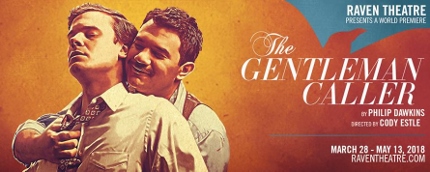SWEET BIRD OF TRUTH
The Gentleman Caller was the original name for a breakthrough “memory play” that, opening at Chicago’s Civic Theatre in late 1944, made Tom “Tennessee” Williams famous at 33. It was, of course, The Glass Menagerie, his most personal labor of love. That character — “James O’Connor” — represented the mysterious stranger who, like a catalyst, changes everything but remains unchanged. Later, Williams’ martyr/tramp Blanche DuBois would collect a veritable bouquet of these beaux; but in Williams’ inaugural gift to the stage, Laura Wingfield, Williams’ surrogate sister “Rose,” only needed one. Apparently, the same was true for her author.
The Gentleman Caller is also the very appropriate title for Chicago playwright Philip Dawkins’ latest success. It’s a heartfelt, two-act speculation about two writers who deeply influenced and deserved each other and who utterly transformed American theater. Warmly helmed by Cody Estle, this world premiere from Raven Theatre is a vibrant Valentine to the theater — its demands and rewards for playwright and critics alike. It earnestly explores the highs and lows of writers’ addictions, magnificent obsessions that, ironically, draw so much outer art from so much inner emptiness.
Based on their sole but seminal encounters in November and on New Year’s Eve 1944, this eloquent 140-minute drama delivers more than a meeting of minds of two men from Missouri. Hearts, souls, and, yes, bodies connect as Tennessee Williams (A Streetcar Named Desire, Orpheus Descending, Summer and Smoke, Suddenly Last Summer, The Rose Tattoo, The Night of the Iguana, Cat on a Hot Tin Roof) and William Inge (Bus Stop, Dark at the Top of the Stairs, Picnic, Summer Brave, Natural Affection, Come Back, Little Sheba), future titans of Broadway and beyond (and, not accidentally, homosexuals), become each other’s Muse and more. Then they part, fulfilling an unwitting mission to inspire, to pursue their stellar and anguished careers.
Set in the comfortable parlor of the St. Louis apartment (beautifully appointed by Jeffrey D. Kmiec) occupied by the 30-year-old William Inge, the first act is based on an interview that the then-theater critic conducted with then-unknown Williams. Significantly, it’s on the eve of Williams’ first and greatest triumph, his Chicago baptism in glory. The seeds it plants blossom in the climactic second act, set in Williams’ characteristically messy room in the Sherman Hotel, a week after The Glass Menagerie secures his future.
In between, these gentlemen callers discover a commonality of need and nature that will shape their shows.
Because, for all the necessary conflict that Dawkins injects to keep the fur flying (including Williams’ being bitten by Inge’s yappy dog), it’s the similarities that make Williams and Inge, necessarily closet cases, soul rather than sexual mates. Troubadours of life’s underdogs, both were alcoholics, plagued by loneliness and a hunger for the “kindness of strangers,” suffering from unpromising origins and stunted childhoods. Masters of contagious sentimentality, these “confirmed bachelors” projected their pain onto all their characters (the “broken ones,” Tennessee calls them). That’s one reason why this dramatist (“I love everyone and no one at all”) should not have been surprised when a now-worshipful Inge tells him that he is just as much Laura as he is Tom Wingfield, victim and storyteller.
But the differences between these “angry young men” are crucial too. At first Williams manages to interview as much as he’s questioned, offering tough-love advice to a very insecure Inge. He urges this critic to go beyond his byline and turn his envy of Williams’ make-believe into his own word-magic.
Always plagued by his “blue devils,” a neurasthenic Williams is rightly enraged that a perhaps envious Inge has failed to read Menagerie. When Williams finally receives Inge’s first effort, we fear he’ll return the (bad) compliment. But Williams senses that, though dreaming of a perfect lover who will never come, Inge must (temporarily) overcome his suicidal self-pity to remake life to his visions. Like Oscar Wilde before them, both absolutely insist that art improve on life.
By the second act’s final secret-sharing (including a vicious gay bashing that Williams endured), these young authors, raw nerves in constant agitation, expose more than they can ever retract. Freeing themselves as they do, they admit the lies they tell to survive. Triggered by glimpsing coupling lesbians across the street, they carnally connect, here emblematic of an even closer contact.
Together alone, Inge and Williams discover that, as Williams tenderly puts it, they both “write for love” — not to get it but to earn it. Williams promises to give Inge’s first script, Farther off from Heaven, to his agent Audrey Wood. A second star is born.
Above all, these originals write obsessively in the teeth of a world where, as Inge describes in a final horrific confession, killer kids can sacrifice innocent cats to carnivorous monkeys at the St. Louis Zoo. Like Blanche putting paper lamp shades around bare bulbs, Williams prefers to hear life’s softer sounds (even though his first play — a prison saga, of all things — bore the cautionary title Not About Nightingales). Painfully sensitive souls, Dawkins’ apprentice writers must learn to strike out so they can’t be hurt. They will put their whole hearts into every script.
Not at all incidentally, in a feat of rich casting, Rudy Galvan plays Williams with a cocky vulnerability that’s very accurate to his self-sarcastic source. Curtis Edward Jackson is the more reticent Inge: A true believer, his discovery of The Glass Menagerie (in his case, better seen than read) and its compassionate chronicler opens him up: He too will side, splendidly, with life’s losers.
The work of a sweetly kindred artist, The Gentleman Caller is a very eligible suitor for any audience. Nothing is more enthralling than when theater blesses theater. It’s happening right now on Clark Street.
photos by Michael Brosilow
The Gentleman Caller
Raven Theatre Company, 6157 N. Clark St. (at Granville)
Thurs-Sat at 8; Sun at 3:30
ends on May 13, 2018 EXTENDED to May 27, 2018
for tickets, call 773.338.2177 or visit Raven Theatre
for more, visit Theatre in Chicago








